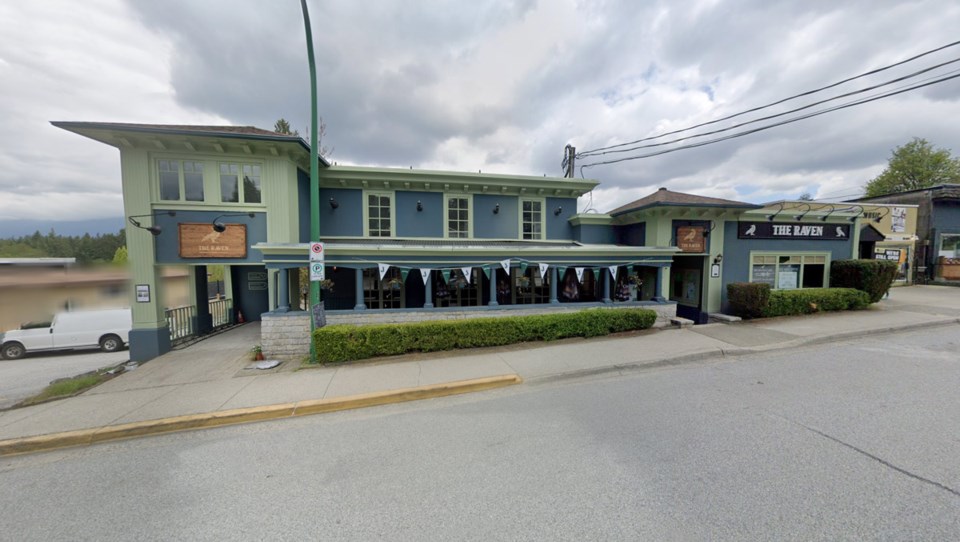BC’s restaurant sector continues to grapple with post-pandemic challenges, but opportunities abound for buyers.
Chris van Vliet, William Wright Commercial’s Langley office team leader, said the last time he checked there were 124 restaurants for sale in Vancouver and hundreds available in B.C. According to Spacelist.ca, about 500 commercial spaces, including restaurants, were listed in mid-September.
The Raven, a pub in Deep Cove owned by IRL Group, was recently listed for $488,000.
“It’s the only pub in the Deep Cove community,” said van Vliet. “It’s very well-established.”
Opened in 1979, the fully renovated 6,081-square-foot establishment nets about $200,000 in annual profits.
The restaurant sector, already prone to turnover, saw many operators struggle when public health restrictions triggered by COVID-19 prompted many to reduce or suspend operations. Those that secured Canada Emergency Business Account (CEBA) loans – a lifeline for many – then faced a repayment deadline this past January. Some were not able to make it.
“That caused a lot of problems,” van Vliet told Western Investor. “These restaurants were hanging on and trying to recover from COVID, but when that loan became due they couldn’t pay it back. We did see some restaurants basically shut down due to that.”
The food and beverage real estate landscape has changed as well.
“Where we used to be able to sell a restaurant for a certain price, now what the sellers are competing with are restaurants that are just simply for lease,” said van Vliet.
This has created a buyer’s market for restaurants, van Vliet said, with many in prime locations available at favourable prices, largely due to bankruptcies. In February, Restaurants Canada reported 62 per cent of restaurants were operating at a loss or barely breaking even, compared with 10 per cent pre-pandemic. Last year saw a notable upsurge in closures, with bankruptcies up 44 per cent.
“Before COVID, those restaurants could have garnered a much higher price. In general, restaurants are selling at much lower prices,” said van Vliet, with many listed at half their pre-pandemic value.
Despite their challenges, van Vliet said well-performing, turnkey establishments are still viable investments.
Serving up unique opportunities
The agri-tourism space offers opportunities, as demonstrated by the recent $4 million sale of Abbotsford’s Tanglebank Gardens & Nursery and Brambles Bistro, a nursery and restaurant within the Agricultural Land Reserve (ALR). The 1,975-square-foot turnkey business sits on eight hectares (20 acres).
“It’s one of the rare properties with a full liquor licence on ALR land,” said Rajin Gill, a BC Farm & Ranch Realty Corp. agent.
With the liquor licence and permits transferred, the new owners can expand by offering dinner menus and hosting events like weddings.
“It’s a very unique property where the foundation has been laid,” said Gill. “We were looking for buyers who were going to take it to the next level.”
Gill, who mainly sells farms and acreages, has seen a rise in buyers looking to engage in family-oriented, outdoor activities since the pandemic.
“It’s only gotten busier in the past five years with businesses related to agriculture, whether that be bistros, wineries, breweries or corn mazes,” he said.
Sector challenges
Meanwhile, the broader restaurant sector continues to struggle. In January, the British Columbia Restaurant and Foodservices Association and Restaurants Canada launched a Save B.C. Restaurants campaign to raise awareness about the industry’s difficulties.
B.C. has more than 15,000 restaurants and food-service vendors, employing about 185,000 workers and generating $18 billion annually, according to Restaurants Canada. Despite year-over-year sales growth of about four per cent, soaring costs and dwindling customer traffic remain critical challenges.
Restaurants Canada’s Q2 2024 report highlights that the cost of food rose by 25 per cent over the past two years, while labour costs ballooned by 18 per cent. In April 2024, 74 restaurants declared bankruptcy.
The report notes that many restaurants close without formally declaring bankruptcy, meaning the true number of closures is likely higher.




